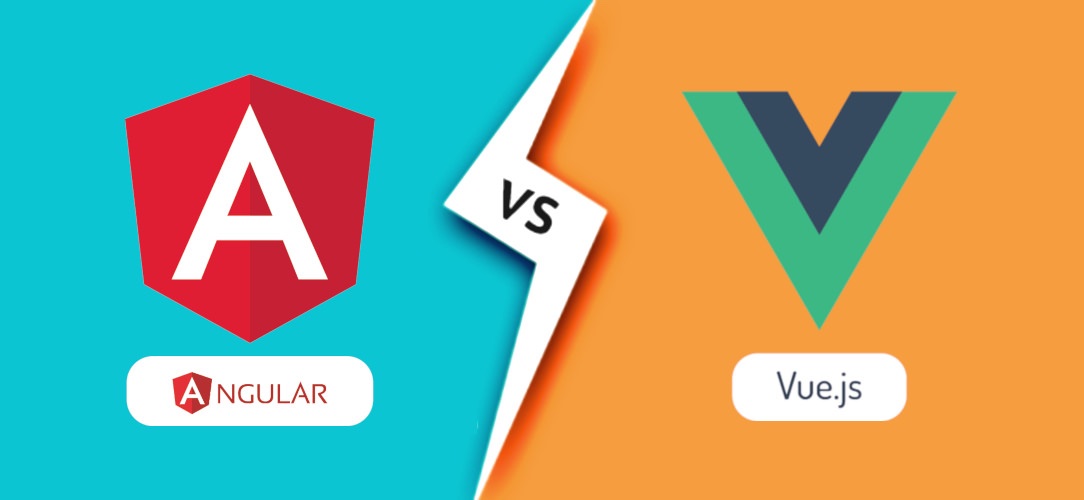Back in the day, it seemed like every software developer wanted to reinvent the wheel every few years by creating their own framework. For the developers, it was more than just having another option to play with; creating their own framework earned them bragging rights among their peers, which was too hard to resist.
The good news is that the race to create more frameworks has died down over the past years. And once the dust settled, only a handful of noteworthy frameworks remained. Here, we are going to pit two such frameworks together to find which is better. If you haven’t guessed it already, we’re talking about Vue and Angular.
While both of these frameworks have a considerable fan following of software developers and rightly so, here we are going to take a look at what separates Vue from Angular, and vice versa.
What is Angular?
While the syntax of both these frameworks is similar, the use cases of Vue and Angular are different and are illustrated by the history of each individual framework. Angular is considered to be an extremely popular corporate solution. This is the reason why banks and financial institutions use Angular to build their websites. Additionally, many backend developers also prefer to use Angular for the same purposes that it is easy to use. Angular is also backed by Google and other companies such as PayPal and Instagram along with many others.
What is Vue?
The Vue framework was created by Evan You, an employee of Google who also worked on Angular. This means that Evan had in-depth knowledge of Angular while developing Vue. The whole idea surrounding Vue’s creation is to have a way to build fast and responsive JavaScript applications within the least amount of time. The high efficiency and short learning curve is the reason why many companies such as Alibaba and Grammarly use Vue.js.
In a nutshell, Angular is considered to be the default option for the development of enterprise applications. It is larger and has a more mature framework but usually takes more time for application development. On the other hand, Vue is seen as the answer for simple to use and fast app development as well as fast prototyping.
Community Size
When it comes to their communities, Angular does have a larger community and is backed by Google. This means that Angular tends to be evolving at a healthy pace since it’s been around for a while, and it’s trusted by many developers. Angular currently has around 313k followers on Twitter, which is larger than Vue’s following of a modest 128k. But, Vue is a relatively new framework as compared to the two and is growing its community at a steady pace. Regardless of which framework you’ll be using, you are sure to find help when needed from the large communities that use both frameworks.
Data Binding
Angular uses two-way binding and also provides support for asynchronous services as well that can help programmers who want to incorporate elements that are built by a third party.
On the other hand, Vue uses a one-way data flow amid the elements. It also facilitates the flow of data effortlessly and allows non-trivial application development fast and efficient. While working on Vue, programmers can also utilize libraries for asynchronous services.
Level of Complexity
It goes without saying that Angular is considered to be more complex as compared to Vue. This is mainly because Angular has been around for a while, and Vue was developed as a lighter and easier-to-use framework. Vue is simpler to use both in terms of API and design, which is one of the factors that makes Vue so appealing to developers. As a result, building a complex app on Angular is far more time consuming and labor-intensive as compared to using Vue.
Also, Angular’s documentation is far more complicated, which is why developers have to waste a lot of their time just to understand Angular’s core concepts. This makes it harder for someone who is new to Angular to get a grasp of the language while coding and building applications for the first time.
On the other hand, Vue is considered to be a far more efficient and easy-to-use framework. Any developers who have basic knowledge of HTML, CSS, and JavaScript can easily build a single-page application using Vue, which is something that’s not possible with Angular.
Flexibility
When it comes to flexibility, Angular offers support for systems without any restrictions on the overall structure of a project. Developers hold Angular in high regard because of its flexibility. While Angular is opinionated, developers have to follow the project structure and also follow specific design patterns. On the other hand, Vue also offers a certain level of flexibility while developing applications.
Performance
The best part about using Angular is that it does not lack when it comes to performance. In fact, Angular is fast and efficient. When the scale of a project is changed, the watchers have to reevaluate the project again. Despite this hiccup, Angular still performs extremely well on multiple benchmarks. The good news is that Vue is just as fast and performs equally well as Angular on similar benchmarks.
Ending Note
So, there you have it. These were some of the similarities and differences between Angular and Vue for those who are considering adopting one in their tech stack. If you are still on the fence when it comes to choosing between Angular or Vue, then the former is a great option if you want to take advantage of its many features and functionalities, while the latter is best suited for small app development projects and for developing applications quickly.
Additionally, those who want to work on Angular need to learn TypeScript and MVC, while that’s not needed with Vue. Vue also delivers basic application templates and offers a higher range of functions as compared to Angular.

